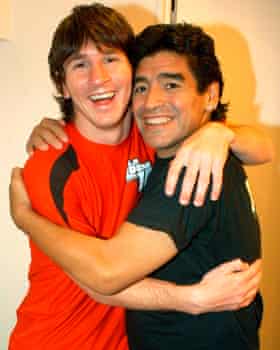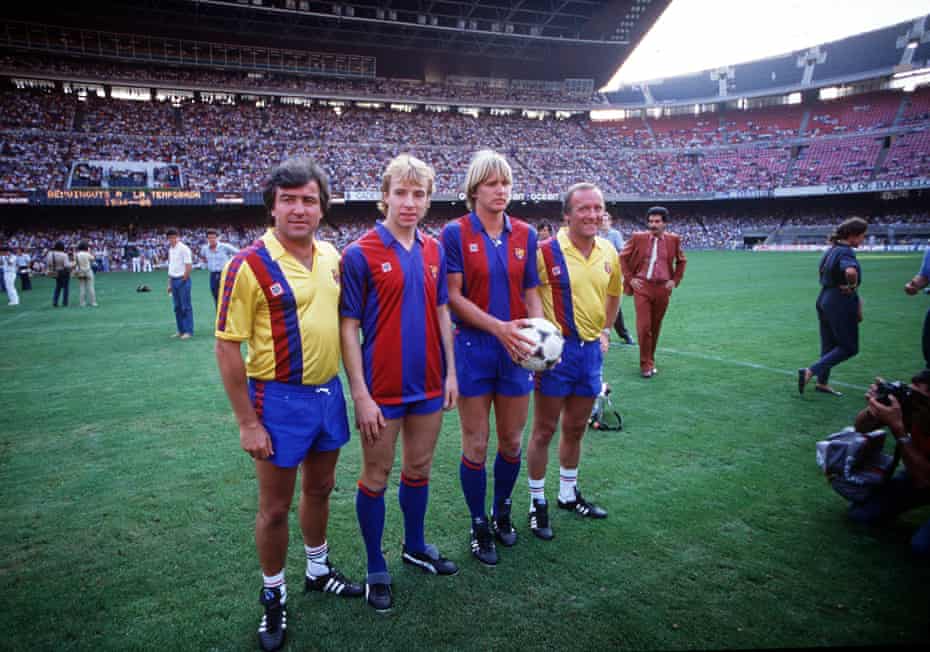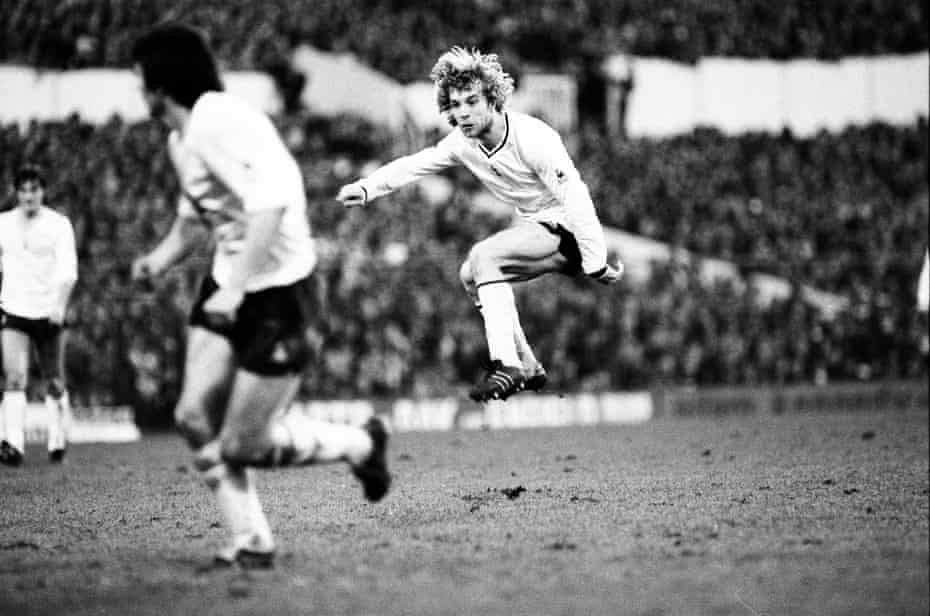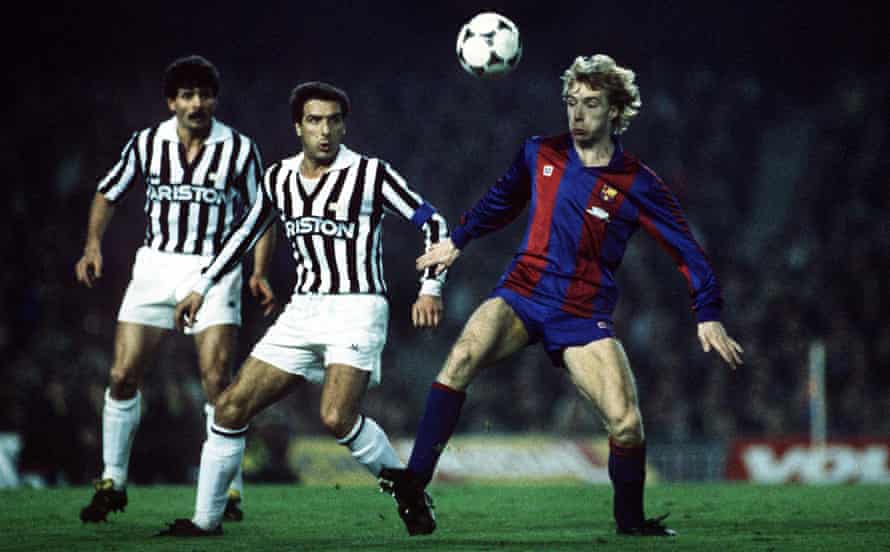The day Steve Archibald walked into the Barcelona dressing room he found Bernd Schuster holding his shirt. He had always worn the same number and the contract he had just signed guaranteed he still would, but the German was not letting go. Not because Schuster was attached to the No 8, but because he was desperate not to wear the other available shirt, sitting there untouched: Diego Maradona’s No 10. “I realised something then,” Archibald says, “about the club, Maradona and the pressure.”
Other people’s pressure, that is. “The only pressure I ever felt was Clyde vs Ayr United, my debut,” he says and if there is a recurring theme over a long conversation looking back on a fascinating life on and off the pitch, it is how tough he is, the sheer bloody-mindedness.
Archibald looked the German in the eyes, explained why the No 8 mattered to him and then did something significant, helping win over his teammate: he let Schuster have it. Fine, he’d wear 10; he didn’t care, even if at every turn he was confronted with Maradona. The shirt was his, even the locker, but so what?
At a time when Barcelona face the prospect of losing Lionel Messi, Archibald is proof there is life after the world’s best player. In Catalonia Messi is bigger than Maradona but the Scot arrived as Maradona departed, immediately won the club’s first league title in more than a decade, and went on to reach a European Cup final. His time offers some optimism, perhaps some lessons too. Starting with: don’t try to replace him at all.
“If you try to replace him, you’re on to a loser,” Archibald says. “It’s impossible, right. I knew Maradona was a humongous figure. You can’t hope to be that, so you have to do what you do. They kept saying: ‘Substitute for Maradona.’ I said: ‘I’m not a substitute for anyone.’ There may be another Messi in a year’s time or five, I don’t know, but there isn’t one now. Impossible. If Messi goes, they have to reorganise. But there’s quality there to make it work.”

In a post-Messi era more players may take responsibility, or perhaps feel liberated. Archibald sees some hiding behind Messi, almost frightened – “it’s blatant” – but insists: “If you play with him, do it his way. He’s good enough. It’s been made clear that everyone wants him to stay, [the new president Joan] Laporta has already said that too. The last board said there was no Plan B. That’s risky. The problem isn’t for Messi to be Plan A, but to have no Plan B.
“But he has everything he could want: sunshine, fans that love him to bits, a team that plays for him,” Archibald adds. “I don’t think he’ll be looking elsewhere. As long as he’s in tune with the club and the manager, great. If he’s focused and invested, stay. If not, go. No one can be bigger than the club: there’s a risk of that. He can’t stay for any reason other than still being the best. He’s 33, so he’s easily, easily got another three years. He’ll adjust his position and his passing and timing are so good.”
Nor does Archibald think Barcelona should retire the shirt Messi wears; the one he wore. “I think that’s ludicrous, I really do. Life goes on. It’s like a bus: there’s another coming. It might not be the same bus but it’s still a bus. Through history great players leave; there’s always someone else.”
Someone like him. Barcelona’s board wanted Hugo Sánchez, sitting upstairs in the same hotel the day Archibald signed, but Terry Venables got his way. “Terry called. He told me Maradona was going, [the manager, César Luis] Menotti too. It hadn’t worked out. ‘I want you.’ I never wanted to go to Barcelona: I wanted to stay at Spurs, but [former Tottenham chairman] Irving Scholar wanted the money. I never regretted it, though: a wonderful experience, better than I could have imagined.”

“Terry believed in me and the key was I had that confidence in myself to score, in my ability. It’s cliched stuff but it is that. I didn’t realise the size of the club but it’s still a pitch, 11 players, a referee, linesmen. I had scored against Man United, Liverpool, Arsenal …”
He pauses and laughs. “Not England, although I never lost to them. I was clean through at Wembley, ready to beat Joe Corrigan, and that bastard Bryan Robson took me down. But I’d played everywhere, scored goals. At Aberdeen we beat the Old Firm. I played for Spurs, played European football, internationals. My confidence has never been knocked. Why should I doubt myself?
“It didn’t matter whose name was on the locker. You’re there for a reason. It’s my turn. I said to the kitman: take that off, put my name on. It was a slot and I was on top of Diego. He left perfumes and stuff behind. I smelled pretty good.”
Archibald recalls teammates thinking “Who the hell is he?”; they soon found out. “Terry thought I was really focused on goals and in Spanish football they weren’t. I remember sessions on a small pitch with tiny goals. Nobody’s really attending the goal and I’m thinking ‘I can score from 30 yards.’ I get the ball, shoot and they’re like: ‘What the hell’s he doing?’ ‘He’s ruining the game.’ I thought: ‘What are you talking about?’ I just got the ball and scored the goal and that changed their heads, tactically. It was visible immediately. They hadn’t seen that attitude.”
Listening to Archibald dissect the striker’s craft, the movement and positioning, that timing to escape, even rethinking where the “far post” is, you get a sense of how he got 19 goals that season. The Barcelona vice-president, Joan Gaspart, had promised double the wages and a statue for figures that good. So? “I asked for double wages, not the statue,” he laughs.
Archibald’s first game, in 1984, was away at Real Madrid, a match he recalls as violent. There were words, and worse: “Drunkard” was the centre-backs’ preferred insult. Archibald scored, Barcelona won 3-0 and went on to be champions for the first time since 1974.

The following year they reached the European Cup final but lost on penalties to Steaua Bucharest, 60,000 fans decamping in Seville for a match many thought a foregone conclusion.
“The league was enormous,” Archibald says. “It took five hours to get from the airport to town. A million people. Seville was my big regret; it should have been historic, the first, but it became a trauma and everything was torn up. You can’t imagine the burning sensation in your stomach when you lose a European Cup final. It lives in all of us. And it wasn’t that we took our eye of the ball.”
Does that accusation annoy you? “It annoys the fuck out of me, it really does,” Archibald shoots back. “I feel aggrieved about it.” He’s even faster when asked if Venables is given the credit he deserves, the question not even complete before he replies: “No.”
“I wish people could understand what Terry did here. It was amazing. The first day, he addressed the fans in Catalan. ‘If he can do that, I can score goals.’ He was way ahead of his time. He had a magnificent style; he’d studied that great Liverpool team. He had new ideas and within two weeks had everybody convinced. A light went on and the players were like: ‘Yeah, this works,’ and it worked like a dream.”
“He gave us freedom but also solutions. Barcelona’s pressing, winning the ball high: that starts with Terry. He deserved that European Cup, the team deserved it. But afterwards, it all changed. Later everything seems to be about [Johan] Cruyff and that upsets me. It was our team that brought Barcelona out of the darkness. I liked Johan, he was a good friend, I loved his team, but it was built on what we’d done. And Johan got the luck Terry didn’t.”

Archibald still lives in Barcelona. There were 10 more clubs before he finally retired, but he never stopped. The stories are many, endless experiences. Like the time he was on Top of the Pops. “Twice,” he says, laughing: Spurs and Scotland performed on the same show in 1982. Which is a great quiz question. “Even better is: ‘Who was the second person to do it?’” Archibald grins. “I beat Glenn [Hoddle] to it: he was on next with England.”
Archibald tells the story of Chas & Dave climbing in a toilet window to perform on the opening night of his pub in Bethnal Green. There was the time he became owner-manager at Airdrie. He worked as an agent, laying claim to recommending the still largely unknown Robert Lewandowski, and Wayne Rooney, and taking Mikel Arteta to Rangers. And there was a proposal to sell memorial spaces for fans’ ashes at football grounds.
It’s not the typical footballer’s career path, although Archibald outlines the parallels between companies and clubs – sales staff as strikers – and says he was always likely to get into business after playing. In fact he had done so before playing, training as a mechanic and opening a garage. “I still have the card: ‘Archibald & Nicol: Rolls Royce, Bentley, Jaguar.’ Black with gold embossed. Six months after we opened I got the offer from Aberdeen.”
Did he ever fix Alex Ferguson’s car? “No, but I used to do that at Clyde. Get cars, do them up, sell them to players. Brian Ahern bought the first: a Vauxhall Viva.”
The Fiver: sign up and get our daily football email.
Bigger projects followed, bigger battles too. Archibald co-founded a renewable energy company called FC Energía and talks proudly of increasing customers 10-fold during the pandemic, changing the business model, building a success. Now, though, he is the target of what he calls “an aggressive, hostile takeover”. His confidence hit for the first time, he says: “Wish me luck, watch this space.”
He may need it but one thing’s clear: Archibald won’t back down. There has always been something determined about him, an iron conviction: it’s the way he played and the way he is, the man who took Diego Maradona’s shirt and won.
from Football | The Guardian https://ift.tt/39jzZX0
via IFTTT

No Comment